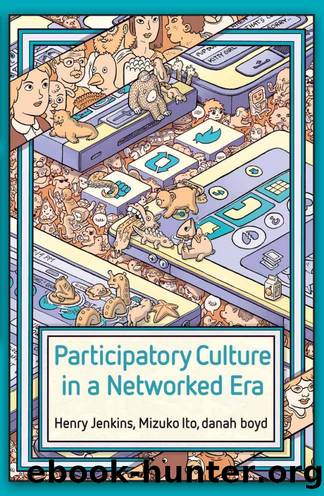Participatory Culture in a Networked Era: A Conversation on Youth, Learning, Commerce, and Politics by Henry Jenkins & Mizuko Ito & danah boyd

Author:Henry Jenkins & Mizuko Ito & danah boyd [Jenkins, Henry]
Language: eng
Format: azw3
ISBN: 9781509503230
Publisher: Wiley
Published: 2015-11-04T16:00:00+00:00
Managing Media Consumption
Mimi: One problem I have with some of the criticism is that the response is to reel things back into old systems of legitimacy, control, and validation: to say no to technology, go back to reading books, and shut off Wi-Fi in the classroom. Just telling kids to disconnect or hoping technology will go away is not realistic or even desirable. The technology is infinitely malleable, and the question we need to be asking is how new norms, practices, and literacies can make our engagements most productive individually and collectively. It’s not a simple binary. We’re starting to devolve power away from institutions to collectives and individuals and networks, and that means that every person has to take responsibility for the credibility of information, their ownership and production of it, in ways that weren’t quite as necessary in an earlier era.
danah: Even information is often boiled down to an assessment of whether a particular piece of media content – or a particular platform – is good or bad. Teenagers tell me that they’ve been told that Wikipedia is bad while Google is good. When I push them on this, I find that they’re often not sure exactly what this means. But they’ve been taught to read certain platforms as trustworthy and to eschew others, with no critical apparatus to understand why. I’m saddened by the low level of computational and media literacy out there and the broad refusal to engage with these issues. It’s easier to be afraid of technology and media than to engage critically with it.
Much of what’s at stake has to do with the ways in which norms and values are negotiated in our networked society and how we reach widespread consensus when there are significant value-laden conflicts. Whose values get to shape public discourse? How do we think about personal desires versus societal benefits? When information and tools reflect values, how are they interpreted or rejected?
Henry: There’s been a tendency behind many of these platforms to assume that what the majority likes is what’s best. This majoritarian logic means that there is very little if any commitment to ensuring that we have access to a diversity of perspectives, rather than simply allowing the most hegemonic thinking to be reproduced yet again. These sites do not necessarily create mechanisms which ensure that minority tastes and interests are fully represented, any more than broadcast media has done so. And, so, one area where we need to develop more critical literacy is around the mechanisms and processes that determine our relative access to different kinds of materials. As we confront today’s complex problems, we need to expand as much as possible the range of solutions that are proposed and the different kinds of expertise we tap. But most of us do not yet have very good tools or skills for seeking out and sustaining this diversity of perspective.
It’s one thing to look at the highest-circulating videos, which tend a bit towards the lowest common denominator – or at least appeal to majority tastes.
Download
This site does not store any files on its server. We only index and link to content provided by other sites. Please contact the content providers to delete copyright contents if any and email us, we'll remove relevant links or contents immediately.
Cecilia; Or, Memoirs of an Heiress — Volume 1 by Fanny Burney(32536)
Cecilia; Or, Memoirs of an Heiress — Volume 2 by Fanny Burney(31934)
Cecilia; Or, Memoirs of an Heiress — Volume 3 by Fanny Burney(31925)
The Great Music City by Andrea Baker(31911)
We're Going to Need More Wine by Gabrielle Union(19030)
All the Missing Girls by Megan Miranda(15921)
Pimp by Iceberg Slim(14476)
Bombshells: Glamour Girls of a Lifetime by Sullivan Steve(14046)
For the Love of Europe by Rick Steves(13854)
Talking to Strangers by Malcolm Gladwell(13339)
Norse Mythology by Gaiman Neil(13332)
Fifty Shades Freed by E L James(13227)
Mindhunter: Inside the FBI's Elite Serial Crime Unit by John E. Douglas & Mark Olshaker(9312)
Crazy Rich Asians by Kevin Kwan(9271)
The Lost Art of Listening by Michael P. Nichols(7485)
Enlightenment Now: The Case for Reason, Science, Humanism, and Progress by Steven Pinker(7303)
The Four Agreements by Don Miguel Ruiz(6739)
Bad Blood by John Carreyrou(6608)
Weapons of Math Destruction by Cathy O'Neil(6260)
